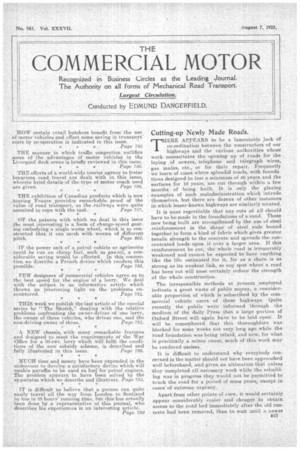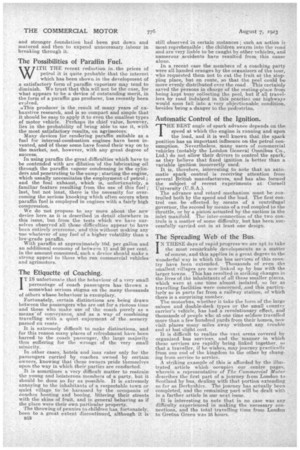Cutting-up Newly Made Roads.
Page 1

Page 2

If you've noticed an error in this article please click here to report it so we can fix it.
THERE APPEARS to be a lamentable Jack of co-ordination between the constructors of our highways and the various authorities whose work necessitates the aliening up of roads for the laying of sewers, telephone and telegraph wires, gas mains, etc., or for their repair. Frequently we learn of cases where splendid roads, with founda tions designed to last a minimum of 40 years and the surfaces for 10 years, are cut through within a few months of being built.. It is only the glaring examples of . such maladministration. which intrude themselves, but there are dozens of other instances in which lesser-known highways are similarly treated.
It is Most regrettable that any cuts at all should have to be. made in the foundations of a road. Those now being built are strengthened by the use of steel reinforcement in the shape of steel rods bound together to form a kind of fabric which gives greater tensile strength to the concrete and spreads the concentrated loads upon it over a larger area. If this reinforcement be cut, the whole road is irreparably weakened and cannot be expected tO have anything like the life estimated for it, for as a chain is as strong as its weakest link, so any spot where a road has been cut will most certainly reducethe strength of the whole construction.
The irresponsible methods at present employed indicate a great waste of public money, a considerable proportion of which is subscribed by the commercial vehicle users of these highways. Quite recently the public were informed through the mediura of the daily Press that a large portion of Oxford Street will again have to be laid open'. It will be remembered filet this thoroughfare was blocked for some 'weeks not very long ago while the road foundation. was being relaid, and now, for what is practically a minor cause, much of this work may be rendered useless.
It is difficult to understand why everybody concerned in the matter should not have been approached well beforehand, and given an ultimatum that unless they completed all necessary work while the rebuilding was in progress they would not be permitted to touch the road for a period of Some years, except in cases of extreme urgency.
Apart from other points of view, it would certainly appear considerably easier and cheaper to obtain access to th,e reed bed immediately after the old concrete had been removed, than to wait until a newer and stronger foundation had been put down and matured and then to expend unnecessary labour in breaking through it.
The Possibilities of Paraffin Fuel.
WITH THE recent reduction in the prices of petrol it is quite probable that the interest which has been shown in the development of a satisfactory form of paraffin vaporizer may tend to diminish. We trust that this will not be the case, for what appears to be a device of Outstanding merit, in the form of a paraffin gas producer, has recently been evolved. s.This producer is the result of many years of exhaustive research, and is so compact and simple that it should be easy to apply it to even the smallest types of motor vehicle. Perhaps its chief value, however, lies in the probability of being able to use it, with the most satisfactory results, on agrimotors. Many devices for rendering paraffin suitable as a fuel for internal-combustion engines have been invented, and Of these some have found their way on to the market, not, however, with any great degree of success. In using paraffin the great difficulties which have to be contended with are dilution of the lubricating oil through the paraffin vapour 'condensing in the cylinders and penetrating to the sump ; starting the engine, which usually necessitates the employment ef petrol ; and the foul exhaust, which is, unfortunately, a familiar feature resulting from the use of this fuel ; last, hut not least; there is the necessity for overcoming the serious knocking which often occurs when paraffin fuel is employed in engines with a fairly high
compression. •
We do not propose to say more ,about the new device here as it is described in detail elsewhere in this issue, but from the tests which we have ourselves observed all these difficulties appear to have been entirely overcome, and this without making any use whatever of any fuel of a higher volatility than a low-grade paraffin. With paraffin at approximately 10,d. per gallon and an additional economy of between 15 and 30 per cent. in the amount consumed, such a device should make a strong appeal to those who run commercial vehicles and agrimoters.
The Etiquette of Coaching.
IT IS unfortunate that the behaviour of a very small percentage of coach passengers has thrown a somewhat serious stigma on the many thousands of others whose behaviour is exemplary. Fortunately, certain distinctions are being drawn between the passerigers.who are out for a riotous time and those who make use of the coach purely as a means • of conveyance, and as a way of combining travelling with a quiet enjoyment of the scenery passed en route. It is extremely difficult to make distinctions, and for this reason many places of refreshment have been barred to the coach' passenger, the large majority thus suffering for the wrongs of the very small minPrity. In other cases, hotels and inns cater only for the passengers carried by coaches owned by certain owners, knowing that these owners pride themselves upon the way in Which their parties are conducted. It is sometimes a very difficult matter to restrain the young and boisterous members of a party, but it should be done so far as possible. It is extremely annoying to the inhabitants of a respectable town or quiet village to be harassed by the occupants of coaches hooting and booing, littering their streets with the skins of fruit, and in general behaving as if the place were their own particular property. The throwing of pennies to children has, fortunately, been to a great extent discontinued, although it is B18 still observed in certain instances ; such an action is most reprehensible : the children swarm into the. road and are very liable to be caught by other vehicles, and numerous ,accidents have resulted from this cause alone. In a recent ease the members of a coaching party were all handed oranges by the organizers of the tour, who requested them not to eat the fruit at the stopping place, but en route, so that the peel could be more evenly distributed over the road This certai•nly saved the persons in charge of the resting-place from being kept busy collecting the peel, but if all travellers by road indulged in this practiese our highways would soon fall into a very objectionable condition, besides being a danger to the pedestrian.
Automatic Control of the Ignition.
THE BEST angle of spark advance depends on the speed at which the engine is running and upon • the load, and it is well known that the spark position has an important influence on the petrol consumption. Nevertheless, many users of commercial vehicles. (notably the London General Omnibus Co., Ltd.) do not allow their drivers to control the spark, as they believe that fixed ignition is better than a variable ignition incorrectly used. It is, therefore, interesting to note that an automatic spark control is receiving attention from several British manufacturers, and has alao formed the subject of recent experiments at Cornell University (U.S.A.). The advance and retard mechanism must be controlled both by the speed and the load. The first control can be effected by means of a centrifugal governor, the second by means of a rod coupled to the throttle, or by a piston actuated by the suction in the inlet manifold. The inter-connection of the two controls is a matter of some difficulty, but has been successfully carried out in at least one design.
The Spreading Web' of the Bus.
IN THESE days of rapidprogress we are apt to take the most remarkable developments as a matter of course, and this applies in a great. degree to the wonderful way in which the bus services of this .country have been extended. Thousands of even the smallest villages. are new linked up by bus with the larger towns. This has resulted in striking changes in the lives of the inhabitants of all these smaller places, which were at one time almost isolated, so far as travelling facilities were concerned,,and this particularly so in parts far from a railway station, of which there is a surprising number. The motorbus, whether it take the form of the large saloon and double4leck types or the small country carrier's vehicle, has had a revolutionary effect, and thousands of people who at one time seldom travelled more than a few hundred yards from their homes, now visit places many miles away without any trouble and at but slight cost. It is difficult to realize the vast areas covered by organized bus services, and the manner in which these services are rapidly being linked together, so that a traveller, if he wishes, may journey practically from one end of the kingdom to the .other by changing from service to service. A striking example of this is afforded by the illustrated article which occupies our centre pages, wherein a. representative of The Commercial :Motor deseribes the first part of a journey fiorri London to Scotland by bus, dealing with that portion extending so far as Derbyshire. The journey has actually been completed, and the remaining part will be dealt with in a further article in our next issue. It is interesting to note that in no ease was any difficulty experienced in making the necessary connections, and the total travelling time from London to .Gretna Green was 35 hours.




























